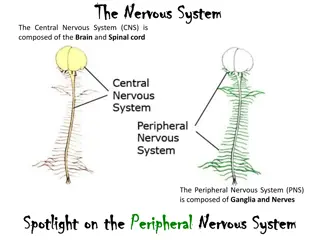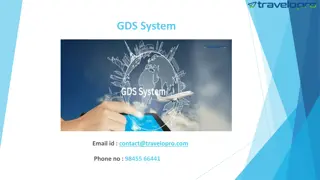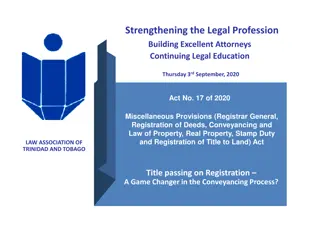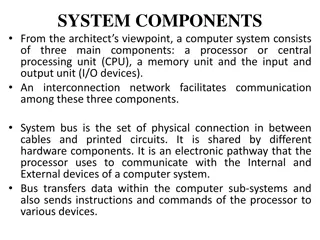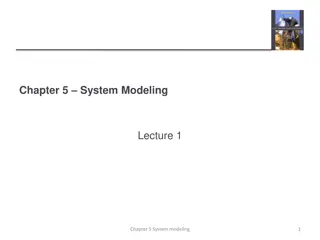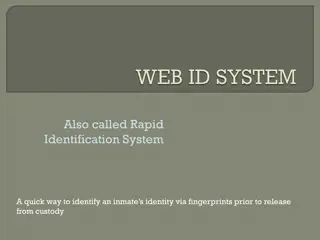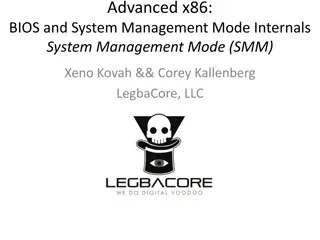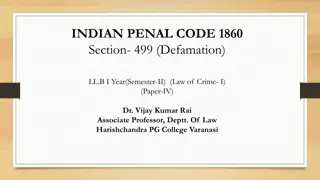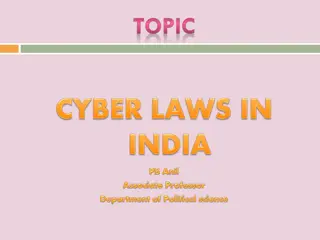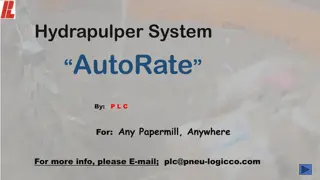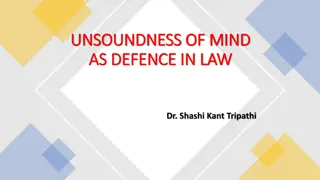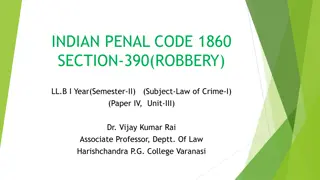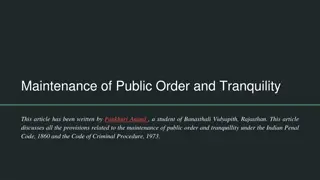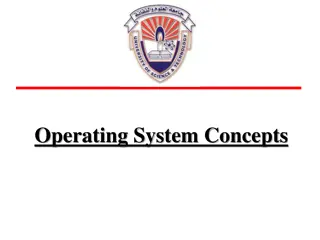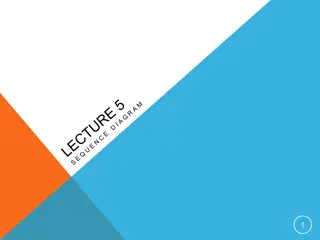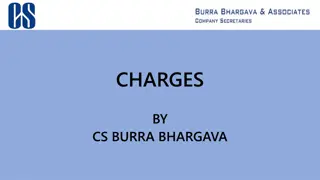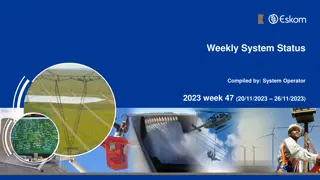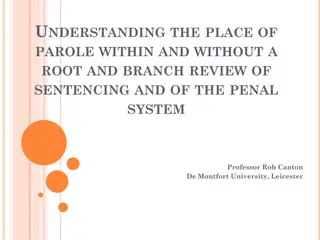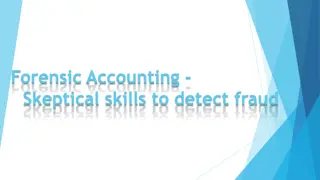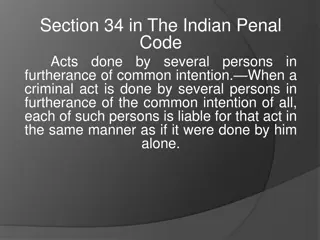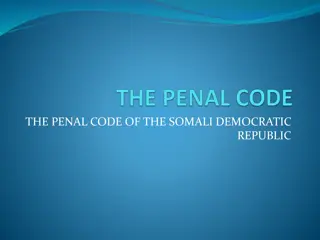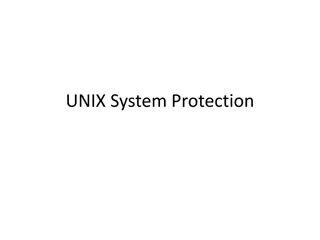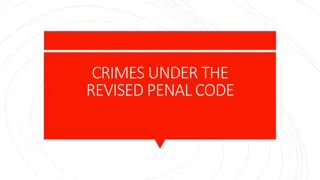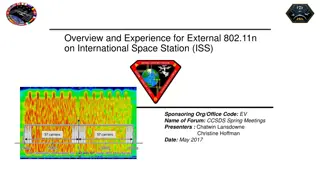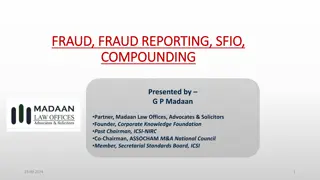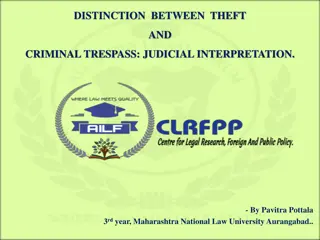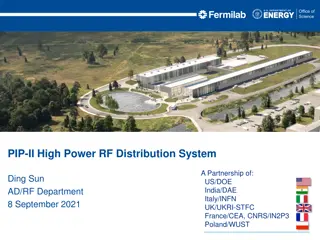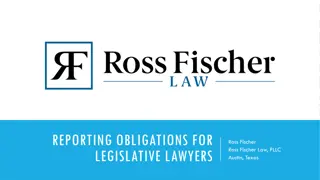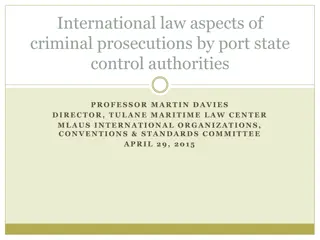adonai software
Adonai college Management System is a cloud-based ERP System that delivers various College and School Management Systems, College and School Management Software, College and School Management System ERP, College and School Management Software System, Online College and School Management Software Sys
3 views • 1 slides
System Models in Software Engineering: A Comprehensive Overview
System models play a crucial role in software engineering, aiding in understanding system functionality and communicating with customers. They include context models, behavioural models, data models, object models, and more, each offering unique perspectives on the system. Different types of system
3 views • 33 slides
Understanding the Nervous System: CNS, PNS, SNS, and ANS
The nervous system comprises the Central Nervous System (CNS) and Peripheral Nervous System (PNS), with the PNS further divided into the Somatic Nervous System (SNS) and Autonomic Nervous System (ANS). The SNS controls voluntary movements of skeletal muscles, while the ANS regulates involuntary proc
2 views • 23 slides
GDS System
Travelopro Global Distribution System (GDS) is a computerized network system. It is a large computer network which is integrated with 100 of worldwide Airlines and consolidators for enabling transactions between travel agents and travel sites and also used by airlines, hotels, car rentals, railways
4 views • 15 slides
Understanding the Immune System: Organs, Functions, and Importance
The immune system acts as a defense mechanism against pathogens and infections, comprising various organs, such as the bone marrow, thymus, spleen, white blood cells, antibodies, complement system, and the lymphatic system. It works to recognize and destroy harmful microbes, maintaining the body's h
1 views • 23 slides
Evolution of Land Law Systems in Trinidad and Tobago
Trinidad and Tobago's land law systems consist of the Common Law System and the Registered Land System. The Common Law system governs unregistered land where title passes upon execution and delivery of the deed. In contrast, the Registered Land System confers ownership upon registration and offers c
0 views • 28 slides
Understanding Free Consent and its Components in Indian Contract Law
Free consent in Indian contract law refers to consent that is not influenced by coercion, undue influence, fraud, misrepresentation, or mistake. Coercion involves committing or threatening to commit acts forbidden by the Indian Penal Code to force someone into an agreement. Undue influence occurs wh
1 views • 13 slides
Understanding Computer System Buses: Components and Functions
A computer system comprises three main components - the CPU, memory unit, and I/O devices connected via an interconnection network, facilitated by the system bus. System buses reduce communication pathways, enabling high-speed data transfer and synchronization between components. Internal buses conn
3 views • 55 slides
Understanding System Modeling in Engineering
System modeling in engineering involves developing abstract models to represent a system from various perspectives using graphical notations like UML. These models aid in understanding system functionality, communicating with stakeholders, and documenting requirements for new systems. Existing and p
2 views • 53 slides
Rapid Identification System for Inmate Release
The Rapid Identification System, also called Rapid ID System, provides a quick way to verify an inmate's identity using fingerprints before release from custody. It allows law enforcement agencies, including IPD users under SDSheriff, to log in and access the system. By searching the San Diego AFIS
3 views • 8 slides
Understanding System Management Mode (SMM) in x86 Processors
System Management Mode (SMM) is a highly privileged mode in x86 processors that provides an isolated environment for critical system operations like power management and hardware control. When the processor enters SMM, it suspends all other tasks and runs proprietary OEM code. Protecting SMM is cruc
1 views • 26 slides
Understanding Defamation Laws in Indian Penal Code 1860 Section 499
Indian Penal Code Section 499 defines defamation as making or publishing any imputation concerning a person intending harm or knowing it will harm their reputation. The section includes explanations regarding imputations towards deceased individuals, companies, and ironic expressions. To constitute
0 views • 10 slides
Understanding Cyber Laws in India
Cyber law in India encompasses the regulations governing cyber crimes, including theft, fraud, defamation, and more under the Indian Penal Code. The Information Technology Act of 2000 addresses modern crimes like cyber terrorism and credit card frauds. The necessity for cyber laws in India arises fr
0 views • 13 slides
Revolutionizing Paper Mill Operations with AutoRate System by P.L.C
AutoRate system by P.L.C offers a superior alternative to manual feed rate control in paper mills, addressing issues of operator variability and inconsistent system responses. By utilizing a Virtual Controller based on inherent system values, the system enhances overall consistency and efficiency, r
2 views • 12 slides
Development of Indian Penal Code (IPC) 1860 and Its Impact in British India
The Indian Penal Code (IPC) of 1860 was introduced in British India after a series of historical events led to the need for a comprehensive criminal justice system. The disintegration of the Mughal Empire paved the way for British takeover, resulting in variations in criminal laws across different B
1 views • 24 slides
Understanding Unsoundness of Mind as a Defense in Law
The concept of unsoundness of mind as a defense in law is explored through principles of criminal liability and historical legal perspectives. The defense under Section 84 of the Indian Penal Code provides immunity for acts committed by individuals incapable of understanding the nature of their acti
1 views • 20 slides
Understanding Section 390 of the Indian Penal Code on Robbery
Section 390 of the Indian Penal Code discusses the concept of robbery and its elements of theft and extortion. It outlines that robbery involves imminent danger or the use of violence, and the offender voluntarily causes harm or induces fear to commit the crime. The section also provides explanation
0 views • 7 slides
Understanding Provisions for Public Order Maintenance in Indian Law
This article by Pankhuri Anand explores provisions in the Indian Penal Code and Code of Criminal Procedure for maintaining public order and tranquility. It discusses unlawful assembly, public nuisance, disputes, and their legal implications. Various sections and definitions are outlined to ensure pe
1 views • 19 slides
LJMU's New Curriculum Management System Project Overview
LJMU's new curriculum management system project aims to streamline course information production and storage by implementing the Courseloop system. The project timeline includes releases for data governance, migration, testing, and training leading up to the system's go-live in September 2022. The p
1 views • 8 slides
Understanding Operating System Concepts: Lecture Overview and Services
Exploring the lecture content on operating system concepts, structures, services, system calls, and file manipulation. Delve into the importance of operating system services, error detection, program execution, I/O operations, protection, security, and resource allocation in operating systems. Learn
4 views • 26 slides
System Sequence Diagrams: Understanding Artifact for System Behavior
System Sequence Diagrams (SSDs) are vital artifacts that visually illustrate input and output events related to a system. They help define system behavior and interactions, making them essential during the logical design phase of software applications. By depicting events in sequential order, SSDs o
2 views • 24 slides
Understanding Charges and Registration according to Companies Act, 2013
This comprehensive content covers the concepts of charges, registration of charges, fee structures, and penal provisions as per the Companies Act, 2013. It explains the duty of companies, fee structures for charges created before and after specific dates, and the importance of timely registration to
0 views • 12 slides
Weekly System Status Update: Adequacy of National Electricity Supply (Week 47, 2023)
This weekly system status report compiled by the System Operator provides insights into the National Electricity Supply System's adequacy in the medium term. It includes data on historic daily peak system capacity/demand, available dispatchable generation, operating reserve margin, forecast vs. actu
1 views • 14 slides
Understanding the Place of Parole: A Review of Sentencing and the Penal System
Exploring the role of parole within the context of sentencing and the penal system, this review delves into themes of justice, risk assessment, rehabilitation programs, victim involvement, offender perspectives, public perceptions, and challenges faced by community supervisors. The discussion touche
1 views • 9 slides
Jordan Penal Code Overview: Punishments for Various Offenses
Jordan's penal code details punishments for different offenses such as murder, assault, intentional harm, negligence causing death, defamation, and document tampering. Penalties include imprisonment with hard labor ranging from five years to fifteen years, and fines up to JD50. Specific articles out
0 views • 8 slides
Understanding Fraud and Forensic Accounting
Fraud is defined as deception to gain an unlawful advantage. Various legal definitions of fraud under Indian law are discussed, including those under the Indian Penal Code, Indian Contract Act, and Companies Act. The concept of forensic accounting in detecting and investigating fraud is also introdu
0 views • 15 slides
Understanding Section 34 in the Indian Penal Code
Section 34 of the Indian Penal Code deals with acts done by several persons in furtherance of a common intention. Common intention involves a prior agreement among offenders to commit an offense, requiring active involvement of all. Key points include pre-arranged planning, participation of two or m
0 views • 10 slides
The Penal Code of the Somali Democratic Republic
The Penal Code of the Somali Democratic Republic comprises three main sections focused on offenses in general, crimes, and contraventions. It specifies that individuals can only be punished for acts explicitly deemed offenses by law and outlines principles governing punishments, jurisdiction, elemen
0 views • 23 slides
Overview of UNIX System Protection
UNIX System Protection focuses on ensuring security and access control mechanisms within the UNIX operating system. Developed in 1969 by Dennis Ritchie and Ken Thompson at AT&T Bell Labs, UNIX features design elements like a portable API, protection rings, kernel processes, and a trusted computing b
0 views • 12 slides
Understanding Direct Bribery and Public Official Offenses
Bribery of public officials under the Revised Penal Code, specifically Articles 210 to 212, involves direct, indirect, and qualified bribery. Direct bribery encompasses acts where a public officer agrees to perform or abstain from acts in exchange for gifts, promises, or considerations. Offenses inv
0 views • 35 slides
Understanding Crime and Deviance: Control, Solutions, and Measurement
Exploring the concepts of crime and deviance, this content delves into various aspects such as types of deviance, agents of social control, solutions to crime, the penal system, methods of punishment, and measurement of crime through victim surveys and self-reported studies. It highlights the comple
0 views • 43 slides
Overview of External Wireless Communication System on International Space Station (ISS)
This presentation covers the overview and experience of implementing an external 802.11n wireless communication system on the International Space Station (ISS). It discusses the existing wireless system, committed users, system architecture, and future challenges. The system provides high data rate
0 views • 18 slides
Understanding Fraud: Definition, Laws, and Implications in India
A comprehensive overview of fraud in India covering its definition, relevant laws from the Indian Contract Act and Indian Penal Code, and the serious implications it carries. Explore the elements that constitute fraud and the legal consequences associated with fraudulent activities.
0 views • 47 slides
Understanding the Distinction Between Theft and Criminal Trespass
Exploring the nuances between theft and criminal trespass under the Indian Penal Code 1860, this study delves into the essential ingredients, punishments, and kinds of offenses associated with each. It emphasizes the importance of judicial interpretation in distinguishing these two crimes, providing
0 views • 10 slides
PIP-II High Power RF Distribution System Overview
The PIP-II High Power RF Distribution System is a collaborative project involving various countries and institutions to develop a sophisticated system capable of efficiently distributing RF power to superconducting cavities. The system consists of multiple distribution lines and components designed
0 views • 28 slides
Adapt or Perish: Exploring Voluntary Sector Responses to Criminal Justice Changes
This research project investigates how voluntary sector organizations in the criminal justice system are adapting to societal changes such as marketization, professionalization, penal drift, and partnerships. Led by a collaborative academic team, the study aims to analyze the evolving landscape and
0 views • 9 slides
Understanding Deviance and Social Control in Society
Exploring deviant behavior through different lenses such as historical, cross-cultural, and situational deviance. Delving into the mechanisms of social control by formal and informal agents like government, police, and peer pressure. Understanding the functions and methods of punishment within the p
0 views • 24 slides
Strategies for Enhancing Extended Producer Responsibility System in Bulgaria
Korea-Bulgaria Knowledge Sharing Program focused on sharing strategies to enhance Bulgaria's Extended Producer Responsibility (EPR) system. The program discusses the current status, performance evaluation, issues, and recommendations related to the EPR system in Korea. It covers topics like beverage
0 views • 38 slides
Understanding Reporting Obligations for Legislative Lawyers
Explore reporting obligations for legislative lawyers including registration triggers, communication guidelines, subject matter influencing legislation, and ethics to advocate in non-adjudicatory proceedings. Discover key differences and requirements under lobby law, PFS law, and the Penal Code.
0 views • 23 slides
International Law Aspects of Criminal Prosecutions by Port State Control Authorities
Explore the intricate legal framework surrounding criminal prosecutions conducted by port state control authorities, focusing on key cases, concepts of jurisdiction, and the impact of international maritime conventions. Delve into the historical significance of cases like The Lotus Case and understa
0 views • 11 slides


